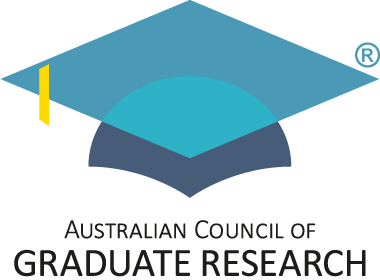Last month we announced the 2021 ACGR Awards for Excellence in Graduate Research Education.
The full list of 2021 winners and special commendation recipients can be found here but over the next three weeks we want to highlight the winners of the 2021 Awards to tell you a bit more about how they have demonstrated outstanding performance in higher degree research Leadership, Supervision, and Industry Engagement.
2021 Excellence in Graduate Research Leadership – Dr Jeanette Fyffe
Dr Jeanette Fyffe is the Manager of the Research Education and Development (RED) team in the Graduate Research School at La Trobe University. Through her leadership of the RED team and direct interventions across the university, Jeanette has had significant impact on graduate researchers, their supervisors, and her RED team colleagues. However, the 2021 ACGR Award particularly recognises her leadership in establishing the importance of intellectual climate and research culture and developing it as a significant area of investment and engagement at La Trobe University.
In 2015, Dr Fyffe established the Intellectual Climate Fund which provides seed grants to promote and support staff and student led initiatives to stimulate and sustain local intellectual climate and communities. She secured financial support from La Trobe University College and Graduate Research School leadership to seed the fund that has now been used to support over 110 grass-roots initiatives towards building intellectual climate.
The Intellectual Climate Fund
The purpose of the fund is to encourage graduate researchers to lead a range of academic, social and cultural activities – online or in person – that will seed or enhance a stimulating intellectual climate and supportive network within their local graduate research community. Through the Intellectual Climate Fund grants of ~$500 are made available for candidates to organise and run activities. The scheme is not prescriptive about whether the activities take place across schools, departments, physical locations, or disciplines; it is really about developing their research community. Graduate researchers may organise academic activities such as conferences and symposia, visual exhibitions, seminars, masterclasses and visiting speakers. This scheme encourages applications that enhance inclusiveness for the graduate researcher community (e.g. from smaller campuses, focused on part-time or international graduate researchers). And the benefits go beyond the activities. In applying to this scheme, graduate researchers can gain additional valuable skills and experience in event organisation, grant application writing, project management, communication, and leadership.
Leadership in graduate researcher support
This innovative Fund initiated by Dr Fyffe has run annually since 2015 and has sponsored a wide range of activities, including journal clubs, writing circles and symposia, and the establishment of networks such as the graduate student representative network, a women in STEM network, a Pan-African student network, and an ongoing grounded theory network. The Fund has been particularly important in stimulating graduate researcher activity on La Trobe’s smaller regional campuses, where candidates can feel particularly isolated. Several of the projects on regional campuses have led to community engagement activity including ‘Research by the River’ in Mildura and the ‘Theory Salon Tram’ in Bendigo.
Leadership in institutional development
But how has the scheme impacted the broader university community? Through Dr Fyffe’s development and coordination of the La Trobe Graduate Research Coordinator Forum, at which Graduate Research Coordinators hear about new initiatives (such as the Intellectual Climate Fund) and share their approaches with each other, Dr Fyffe’s leadership has also supported awareness raising of the importance of intellectual climate with these staff. Additionally, Dr Fyffe has ensured consideration of the intellectual climate within schools and departments has been embedded in Policy and Procedures at La Trobe. Ultimately, Dr Fyffe’s impact in this area of intellectual climate is reflected in the increased satisfaction with intellectual climate in the recent PREQ surveys from a baseline of 34.2% in 2015 to 63.8% in 2020.
Leading the way for best practice across Australian Universities and beyond
Outside of La Trobe, the innovative approach of the Intellectual Climate Fund is reflected in its adoption by other Australian universities, notably the HDR Plus Program which is in place at Sydney University. The scheme has also been recognised by peers, with ACGR Convenor Elect Professor Imelda Whelehan affirming the good work of the Intellectual Climate Fund. Beyond Australia, Dr Fyffe has presented her work as an invited speaker at the International Academic Identities Conference in Hiroshima in September 2019, presenting a paper titled: The intellectual environment understood as Stewardship: conceptualising its material forms.
Outcomes from the Intellectual Climate Fund at La Trobe
To find out more about the activities supported by the Intellectual Climate Fund and how they have impacted the La Trobe research community in different ways, check out the RED Alert blog:
- Running a symposium (Emily Foley)
- Pandemic PhDs: Starting a doctorate in 2020 (The PhD Pod)
- Great advice from a ‘Careers in science’ panel (Jemma Gasperoni, Jordyn Thomas, and Keaton Crosse)
- Why journal clubs matter (Corina Modderman and Carol Reid)
- Communicating your research: the complex language of science (Ebony Monson)
- Opening space for creative research methods (Sarah Houseman)
- And many more…
Congratulations Dr Jeanette Fyffe!
The ACGR again congratulates Jeanette on the 2021 Award for Excellence in Graduate Research Leadership.
You can hear more from Jeanette and her colleagues that nominated her for the award here:
Photo by Nathan Duck on Unsplash

Leave a comment